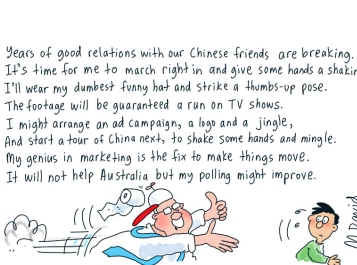If there is nothing you really believe in, consistency is an optional extra.
The sacrament is torn, the veil of the temple is rent in twain.
The sacred surplus is sacred no more. It is defrocked, excommunicated, cast into the outer darkness.
Or, as Prime Minister Scott Morrison put it in the quaint English he had learned in his apprenticeship in marketing, “The surplus is of no focus to me”.
So the great transubstantiator, hotly pursued by his eager altar boy, Treasurer Josh Frydenberg, has casually ditched the holy grail he has urged us to achieve for the last God knows how many years. From being the central tenet of his government’s gospel, the surplus has been relegated to a footnote in the Apocrypha.
It was, I suppose, inevitable: if there is nothing you really believe in, consistency is an optional extra. And to be fair to Morrison (always a risky concession), he has always left a few loopholes and weasel words just in case things go pear-shaped.
A surplus, we have been assured until our ears bled, was the foundation of a strong budget. But a strong budget, while absolutely essential, was never an end in itself; it was just the bank from which we could pay for all the goodies he and his team can provide — health, education, welfare, the go you get when you have a go.
So it follows that when we self-evidently do not have a strong budget, as almost weekly statistics regularly confirm, there is probably not much point in chasing the chimera of a surplus. And this applies particularly when an exasperated public have made it clear that there are more urgent priorities.
Or, as Morrison puts it:
“What matters to me is the human cost and meeting whatever costs we need to meet.”
By this, he means that he has buggered up his approach to the bushfires so comprehensively that all that matters is finding a way to get out of the disaster — principle, like money, is no object.
It started in the past, with his capitulation – indeed, his collaboration – to the troglodytes in his party room, in which climate change denial is a given and therefore any possible consequences from ignoring it are simply irrelevant. So preparations and precautions were comprehensively neglected and even downgraded — funds were shaved when they needed to be ramped up.
There were no immediate votes in taking out insurance; the taxpayer money could be better utilised in bribing the avaricious base, so the miners, Christian fundamentalists and Peter Dutton’s armies of spooks and enforcers arrived in his office with their claws out.
And then the present arrived, with the conflagration supercharged by climate change and the drought that followed it; but Morrison, unwilling to alter the habits of a lifetime, declared it was no time for the Commonwealth to intervene — after all, bushfires were a state responsibility. Business as usual.
So the Prime Minister went on holiday to Hawaii and when he returned partied in Kirribilli. He belatedly tried to buy himself out of trouble but failed to tell anyone concerned what he was actually doing, beyond posting a self-congratulatory message on the internet.
And then it turned out after even superficial inspection that much of what he had lauded as generosity to the afflicted was in fact a con; as is normal for his government, the welfare benefits were to be made as niggardly and inaccessible as possible. The compensation for volunteer firefighters, for instance, is in fact so circumscribed with qualifications, loopholes and restrictions that few, if any, of those promised $300 a week will see much of it, if anything at all.
So the present, like the past, must be left in a smouldering ruin like most of the country. And since money is seen by Morrison as the solution for everything, the surplus is to be relegated as a second-order issue.
This doesn’t mean it will not be revived, assuming the Chinese steelmakers continue to do their part in propping up the remnants of the economy — when the ashes cool, there will be time for more self-congratulation around budget time.
But for the moment, it is all about political damage control and that means spending whatever money it takes. There are risks with this — there always are with making policy on the run, without serious consideration or consultation and more than a touch of panic. The obvious one is that until the detail is nutted out, it is seldom clear about just who is to get what, how much, when and for how long.
Morrison, Frydenberg and Andrew Colvin, who has been given the unenviable task of Distributor in Chief, have all insisted that red tape will be cut to the minimum and no doubt they will do their best. But both the Federal and State bureaucracies have a formidable inertia of their own and an innate reluctance to spend as little money as possible — see above the problems with the compensation for volunteers.
However, much goodwill can be spread around; there will be those who will be frustrated, disappointed and who will feel that they have been dudded and misled.
But the longer-term issue for Morrison is that whatever the immediate political gain, he cannot avoid the accusation that he has walked away from a key promise — not his first one, but perhaps his most important. The surplus was the ne plus ultra — it was supposed to be the stone on which everything else rested. If it has turned to sand, what is left?
It is not so long ago that Kevin Rudd’s credibility was shredded when he walked away from his commitment to an emissions trading scheme as his core election promise, and Rudd at least had the excuse that a recalcitrant senate had consistently blocked progress. Morrison lacks even this fig leaf — there have been arguments that the surplus should not have been the priority, but there was no serious political opposition to its implementation. Indeed, it is hard to see how Parliament could have prevented it even if it had wished to try.
ScoMo has no excuse beyond expediency, opportunism and desperation. Not, perhaps, the most promising start to what is likely to be a fraught and eventful year.
Mungo MacCallum is a veteran journalist who worked for many years in the Canberra Press Gallery. This article was published on 'Pearls and Irritations' and is republished with permission.
Support independent journalism Subscribe to IA.











